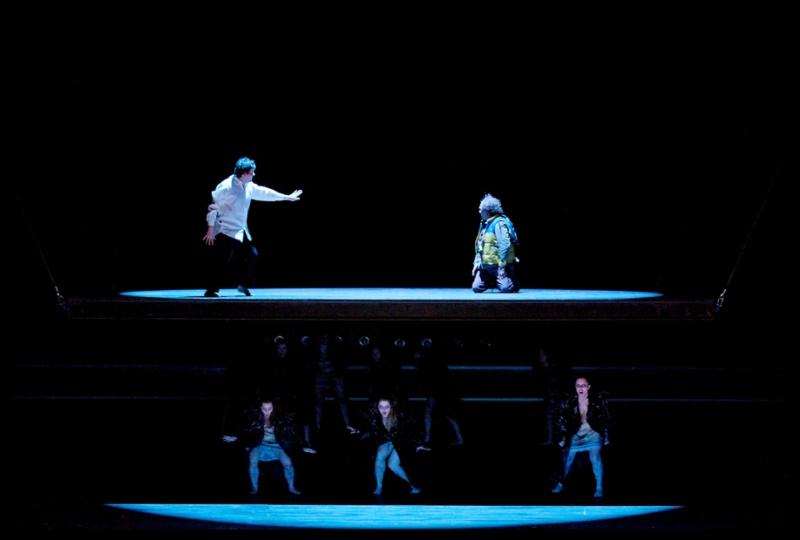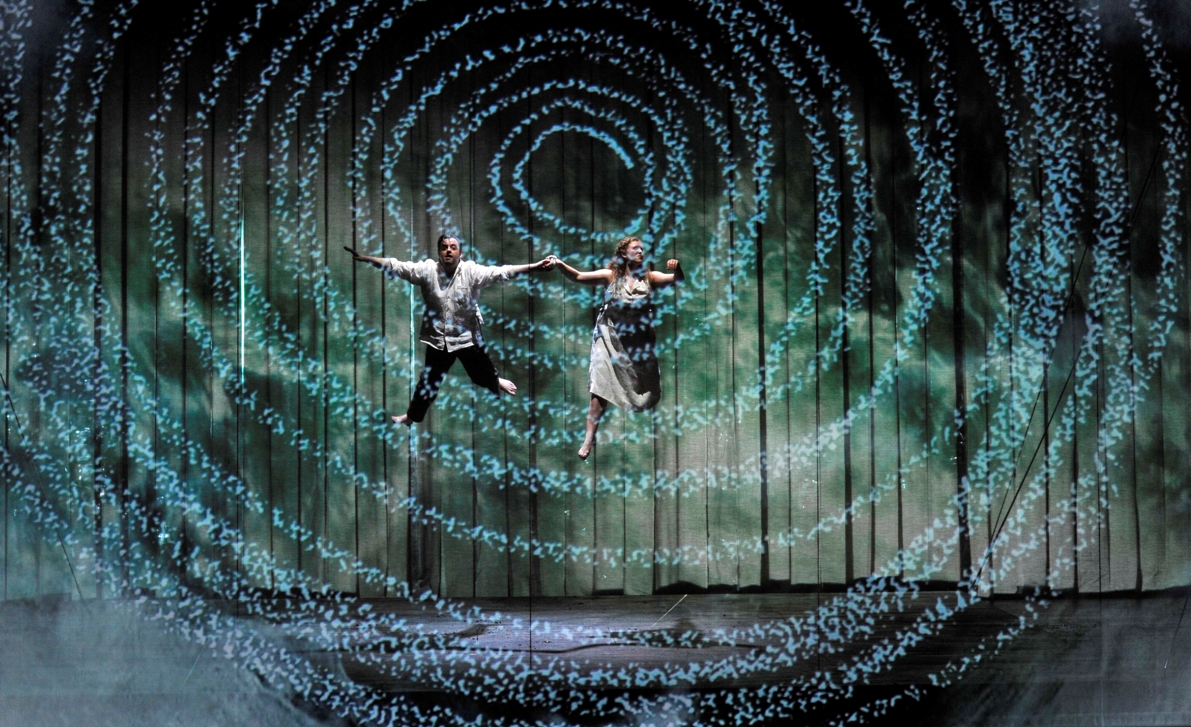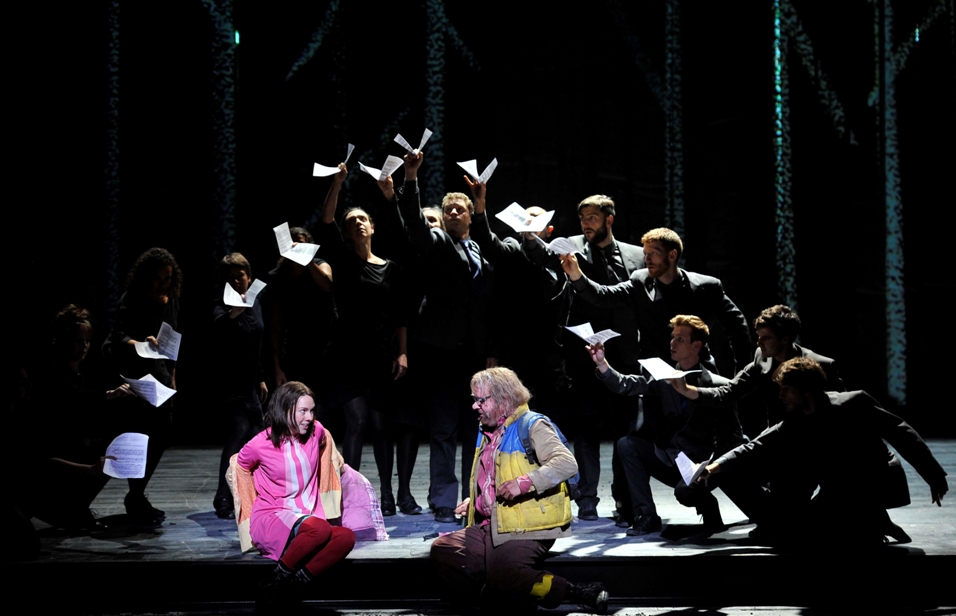The Magic Flute, English National Opera | reviews, news & interviews
The Magic Flute, English National Opera
The Magic Flute, English National Opera
Mozart's Oz becomes black-and-white post-nuclear Kansas as the Complicite style falls flat

There’s a scene in Mozart’s most metaphysical opera which Ingmar Bergman, creator of what is still the richest of all Magic Flutes, describes as “at the outermost limit of life”. Hero Tamino seems to have reached a point of no return and no going forward. “When will this darkness end?”, he asks, and voices reply, “Soon, soon or never”.
We must believe the extremity in that rite of passage. But not only are the vital choral responses unmysterious and perfunctory in this new ENO production; Complicite director Simon McBurney has it that the page of a giant video-projected picture book has already turned a new leaf. Ah, a bestiary – so we’re already on to the next stage in the story, Tamino's Orpheus-serenade to the beasts, or rather his female counterpart's from the ENO orchestra, when we need to be in the moment. It’s information overload as usual.
This is both the most restless and the most lightless of interpretations. If Mozart’s rainbow-hued score is Oz in excelsis, full of warmth and wit as well as profundity, here we’re stuck in a mostly black-and-white, poker-faced, post-nuclear Kansas of strip-lit underground bunkers peopled by sinister men in suits and a cult-leader Sarastro in reflector specs. The singers over-project and force tone with an attitude the very opposite of the composer’s easy-seeming naturalness. What promises so much at the start, with a raised pit where instrumentalists are set to become equal participants with the singers as they fizz in newcomer Gergely Madaras’s account of the Overture, quickly becomes overdrive both orchestral and vocal with grim, charmless ladies and a speed through the sublime music of the Three Spirits who take over their guidance on a magic journey.
 McBurney’s mesmerising production of the Bulgakov-adapted novelty A Dog’s Heart at ENO proved that video design in opera was not the outworn cliché it seemed by then to have already become; this time, for all the valiant efforts of the stalwart Finn Ross, it constantly has you asking whether so much might be more magically done with the more conventional means at music-theatre’s disposal. There are moments of customary Complicite invention: the trials in which Pamina leads Tamino through fire and water (Ben Johnson and Devon Guthrie pictured above in the first of two ENO production shots by Robbie Jack) respectively blaze and bubble with hallucinatory intensity, and the sun puts in a luminous appearance – I won’t spoil the effect by explaining how it’s represented– at the end.
McBurney’s mesmerising production of the Bulgakov-adapted novelty A Dog’s Heart at ENO proved that video design in opera was not the outworn cliché it seemed by then to have already become; this time, for all the valiant efforts of the stalwart Finn Ross, it constantly has you asking whether so much might be more magically done with the more conventional means at music-theatre’s disposal. There are moments of customary Complicite invention: the trials in which Pamina leads Tamino through fire and water (Ben Johnson and Devon Guthrie pictured above in the first of two ENO production shots by Robbie Jack) respectively blaze and bubble with hallucinatory intensity, and the sun puts in a luminous appearance – I won’t spoil the effect by explaining how it’s represented– at the end.
Unfortunately it’s too little light too late, as is the belated humour of Roland Wood’s overspread-baritone Papageno in a genuinely funny scene with wine bottles and a reluctant glockenspielist/glockenspielerin (she deserves a programme credit as much as flautist Katie Bedford). Such moments are not, alas, as redemptive or show-saving as Calixto Bieito’s crucial string-quartet coup in his much maligned Fidelio, and would that the video images in conjunction with Michael Levine's bare set design anywhere equalled the haunting photographs of Robert and Shana ParkeHarrison reproduced in the programme.
No one is vocally in top form, though given the distractions it’s not surprising. Ben Johnson delivers his aria of enchantment at Pamina’s portrait with a forcefulness verging on the heldentenor-esque; his true love come to life, Devon Guthrie, is equally gutsy and determined, reminding us that it's a strong, good woman who redeems the secret brotherhood. Yet she only really hits the heights when facing Sarastro or grieving at Tamino’s apparent turning away. Tuning is a problem for Cornelia Götz’s crippled, Miss Havishamy Queen of the Night – though she pips out all the notes in her coloratura bar a weaker top F with luminous accuracy – and for Steven Page’s Speaker, who needs to be in much closer communication with Johnson's acolyte.
 Brian Galliford’s wicked henchman Monostatos is all over the place vocally, and repellent beyond the call of duty. Ladies and boys – done up as skeletal old men - do a fine vocal job and James Creswell, so good earlier this season as Rocco in Fidelio, makes an imposing impression at first, but not ultimately one of benevolence or goodness; how can he when the production insists he’s creepy, manipulative and cold?
Brian Galliford’s wicked henchman Monostatos is all over the place vocally, and repellent beyond the call of duty. Ladies and boys – done up as skeletal old men - do a fine vocal job and James Creswell, so good earlier this season as Rocco in Fidelio, makes an imposing impression at first, but not ultimately one of benevolence or goodness; how can he when the production insists he’s creepy, manipulative and cold?
In fact those are the only terms to describe this production. Its additional annoyances are the rocking platform, creating mal de mer (in Pamina's case mal de mère) when we need stillness, and the insistent apocalyptic sound design by Gareth Fry. It thunders and rumbles through the pared-down dialogue, and there’s a thrumming even in some of the musical numbers which creates an air of restlessness as irritating as a Carnegie Hall audience (in my experience, I should add, since a commenter forces me to qualify) .
The 14 actors are noisy and distracting, too, above all in their paper-fluttering birds (pictured above with Mary Bevan as Papagena and Roland Wood as Papageno), and the final nail in the coffin is the dismal translation by Stephen Jeffreys. I thought the stressing of one chant at the Barbican demonstration which I attended beforehand was odd enough – “SOME Russians ARE gay – GET over IT” – but this was more seriously awry; the text just doesn't fit the vocal lines. Anyone expecting a fresh alternative to the durable, colourful Hytner predecessor at ENO may find hopes dampened; best stay at home with either the Bergman classic movie or even – and it’s surprisingly good, if not quite on the same level – Branagh's First World War fantasia.
rating
Explore topics
Share this article
Add comment
The future of Arts Journalism
You can stop theartsdesk.com closing!
We urgently need financing to survive. Our fundraising drive has thus far raised £49,000 but we need to reach £100,000 or we will be forced to close. Please contribute here: https://gofund.me/c3f6033d
And if you can forward this information to anyone who might assist, we’d be grateful.

Subscribe to theartsdesk.com
Thank you for continuing to read our work on theartsdesk.com. For unlimited access to every article in its entirety, including our archive of more than 15,000 pieces, we're asking for £5 per month or £40 per year. We feel it's a very good deal, and hope you do too.
To take a subscription now simply click here.
And if you're looking for that extra gift for a friend or family member, why not treat them to a theartsdesk.com gift subscription?
more Opera
 Tosca, Welsh National Opera review - a great company reduced to brilliance
The old warhorse made special by the basics
Tosca, Welsh National Opera review - a great company reduced to brilliance
The old warhorse made special by the basics
 BBC Proms: The Marriage of Figaro, Glyndebourne Festival review - merriment and menace
Strong Proms transfer for a robust and affecting show
BBC Proms: The Marriage of Figaro, Glyndebourne Festival review - merriment and menace
Strong Proms transfer for a robust and affecting show
 BBC Proms: Suor Angelica, LSO, Pappano review - earthly passion, heavenly grief
A Sister to remember blesses Puccini's convent tragedy
BBC Proms: Suor Angelica, LSO, Pappano review - earthly passion, heavenly grief
A Sister to remember blesses Puccini's convent tragedy
 Orpheus and Eurydice, Opera Queensland/SCO, Edinburgh International Festival 2025 review - dazzling, but distracting
Eye-popping acrobatics don’t always assist in Gluck’s quest for operatic truth
Orpheus and Eurydice, Opera Queensland/SCO, Edinburgh International Festival 2025 review - dazzling, but distracting
Eye-popping acrobatics don’t always assist in Gluck’s quest for operatic truth
 MARS, Irish National Opera review - silly space oddity with fun stretches
Cast, orchestra and production give Jennifer Walshe’s bold collage their all
MARS, Irish National Opera review - silly space oddity with fun stretches
Cast, orchestra and production give Jennifer Walshe’s bold collage their all
 Káťa Kabanová, Glyndebourne review - emotional concentration in a salle modulable
Janáček superbly done through or in spite of the symbolism
Káťa Kabanová, Glyndebourne review - emotional concentration in a salle modulable
Janáček superbly done through or in spite of the symbolism
 Buxton International Festival 2025 review - a lavish offering of smaller-scale work
Allison Cook stands out in a fascinating integrated double bill of Bernstein and Poulenc
Buxton International Festival 2025 review - a lavish offering of smaller-scale work
Allison Cook stands out in a fascinating integrated double bill of Bernstein and Poulenc
 Tosca, Clonter Opera review - beauty and integrity in miniature
Happy surprises and a convincing interpretation of Puccini for today
Tosca, Clonter Opera review - beauty and integrity in miniature
Happy surprises and a convincing interpretation of Puccini for today
 Hamlet, Buxton International Festival review - how to re-imagine re-imagined Shakespeare
Music comes first in very 19th century, very Romantic, very French operatic creation
Hamlet, Buxton International Festival review - how to re-imagine re-imagined Shakespeare
Music comes first in very 19th century, very Romantic, very French operatic creation
 Falstaff, Glyndebourne review - knockabout and nostalgia in postwar Windsor
A fat knight to remember, and snappy stagecraft, overcome some tedious waits
Falstaff, Glyndebourne review - knockabout and nostalgia in postwar Windsor
A fat knight to remember, and snappy stagecraft, overcome some tedious waits
 Salome, LSO, Pappano, Barbican review - a partnership in a million
Asmik Grigorian is vocal perfection in league with a great conductor and orchestra
Salome, LSO, Pappano, Barbican review - a partnership in a million
Asmik Grigorian is vocal perfection in league with a great conductor and orchestra
 Semele, Royal Opera review - unholy smoke
Style comes and goes in a justifiably dark treatment of Handelian myth
Semele, Royal Opera review - unholy smoke
Style comes and goes in a justifiably dark treatment of Handelian myth

Comments
Well said!
Grow up Mr. Nice. Of course
Do you work for ENO? Mr
Grow down, Sir Norman, and
Grow down, Sir Norman, and then perhaps we'll meet somewhere in the middle. Which is where I firmly believe Mozart's masterpiece sits, and not in any pallid way - it's too full of infinite variety for that. Indeed, its possibilities are richer than any one production can manage, but each needs to be as faithful in its own unique way to any of the wide-ranging aspects as it can.
If you'd read the opening carefully, you would have seen that I hardly advocated 'a sunny opera for children'. Far from it: I felt that the unquestionable moment of the 'dark and sinister' in the work was funked.
Frankly I'm a bit surprised that a figure of your stature - if you ARE Sir Norman - can't argue your case more objectively and needs to head towards the language of the troll. Fortunately I know I'm not 'stupid' or childish - or indeed a hate-mongering ignoramus, as a true troll has so designated me more recently.
Dire from start to finish. I
"as irritating as a Carnegie
Four, in all of which there
Four, in all of which there was a general air of restlessness, a low-level noise. And one was for Shostakovich 13 with Yevtushenko reading his Babi Yar poem, so I can't imagine that was an audience come for a popular evening out. I'll add 'my experience of' if that will make you any happier.
The Shostakovich 13
No, I'm talking about the one
No, I'm talking about the one conducted by Ashkenazy (the Masur is on CD, of course). The audience for that was the worst of the lot - not provocatively noisy or coughy, just constantly fiddly and restless.
Vladimir Ashkenazy has never
Check it out (easily enough
Check it out (easily enough done as I just have for dates - http://www.van.org/articles/NikolaiKachanovinterview20030113.htm gives the evidence). Czech Philharmonic, Ashkenazy conducting, a snowy late winter day in New York, early 2003.More or less the same festival as the Philharmonia's. I was a guest speaker at the festival; so was Ashkenazy. Now that's enough.
You are correct, and I
And thank you for a civil
And thank you for a civil coda. I have qualified my comment in the piece, as I wrote I would. I must have hit a bad patch. But I have to say I've never encountered anything quite like it in a 'serious' concert.